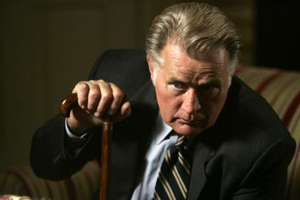Just before NBC broadcast the final episode of “The West Wing” on Sunday night, it aired the series’ 7-year-old pilot, and the contrast between the two — between creator Aaron Sorkin’s crisp and dreamy inaugural show, still cleverer than nearly anything else on television, and Sunday’s labored curtain call on President Jed Bartlet’s two terms in office — seemed fitting, given the series’ subject.
Every presidency, from the best to the worst, begins much the way “The West Wing” did in 1999 — by attempting to cultivate a loyal constituency through the extravagant use of stylized language, and by embracing a romantic, together-we-can-do-anything vision of political life in America. For many administrations, it’s really all downhill from there; after Inauguration Day, the pretty language no longer captivates as it once did, and political romance doesn’t last long after donors start dropping by for nights in the Lincoln Bedroom.
For “The West Wing,” the fall was not nearly so swift, of course. In its first three or four years, there was nothing better on TV, and much of the credit was due to Sorkin’s language and his romance with politics. Bartlet was a progressive Democrat with a deep moral sense and cool head for policy; it also didn’t hurt that he was played by Martin Sheen, who has a knack for what is probably the hardest thing in politics, sounding like people should take you seriously. Then there was Bartlet’s staff: Young, energetic, unfailingly smart, they spoke in a blizzard of quips, jokes, run-ons and irresistible inside references. And they were good people. The folks in Bartlet’s White House stood for things — great, ambitious, important things — and they had big plans for how to make these things real. That’s what set them apart.
We know there were also such people in Kennedy’s White House, and we can guess there may have been one or two in Johnson’s, Nixon’s, Ford’s, Carter’s, Reagan’s, Clinton’s and even George W. Bush’s, at least at the start. But things never pan out the way you’re promised on Inauguration Day, and long before the “The West Wing” finale, Jed Bartlet’s White House, like so many administrations before it, had begun to sink into tedium and repetition. What these people were saying no longer sounded authentic — it sounded packaged. By Sunday’s episode, Bartlet’s administration, like the worst presidencies, had lost all capacity to surprise and inspire.
The show rolled to a halt just as anyone who’s been watching for the past few months would have guessed: Matt Santos, the standard-issue Democratic pol played by Jimmy Smits, took the oath of office as Bartlet’s successor. Josh Lyman, Bartlet’s deputy chief of staff and the show’s center of gravity, became Santos’ chief of staff; Josh (Bradley Whitford) was also finally coupled off with his longtime secretary, Donna Moss (Janel Moloney). Allison Janney’s C.J. got her man too — she and her journalist beau will live happily ever after in California. And the brooding communications director, Toby Ziegler (Richard Schiff), who not long ago was expelled from the White House for leaking classified information to the press, also ended up O.K. In his last official act in office, Bartlet pardoned Toby.
Certainly this was a safe and easy way to end the show, the television equivalent of fastening your seat belt and locking up your tray table as you come in for landing. It’s exactly the sort of finale you’d expect from John Wells, the “E.R.” writer who has managed “The West Wing” since Sorkin left after the 2003 season. Obviously no one knows how Sorkin would have ended this show, but you can guess he’d have taken some kind of risk. His season finales were always formidable spectacles, with unbelievable sequences — assassination attempts, etc. — married to soaring, sometimes over-the-top rhetoric. As it was, in this episode, Sorkin’s participation was limited to an onscreen cameo.
But having watched Bartlet and his staff for all these years, there is one thing I bet Sorkin would have made more of had he penned this parting episode: Regret. It’s probably true that our current president doesn’t have any capacity for introspection, and that on the day he leaves the White House, the experience will slip from his mind like a long-ago bender. But most of us would feel the press of history; you couldn’t work in the most powerful building in the world for eight years and not wonder, on the day you leave, whether you spent your time wisely. Especially not Bartlet. It’s hard to believe — as we’re made to in Wells’ finale — that on Bartlet’s last day on the job, he wouldn’t have made a bigger fuss about all he didn’t get done, about the promise and the hope he’d squandered without ever meaning to.
Then again, maybe we’re spared Bartlet’s histrionics because, in the scheme of things, his fictional presidency was relatively free of sin, at least as compared with how these things often go down in real life. Bartlet’s greatest transgression was lying about his medical condition (multiple sclerosis) during a campaign. He didn’t listen in on Americans’ phone calls. He didn’t ignore a genocide. He didn’t start an unnecessary war.
Perhaps the only thing to regret, after seven years, is that Bartlet’s administration only ever served on TV.

